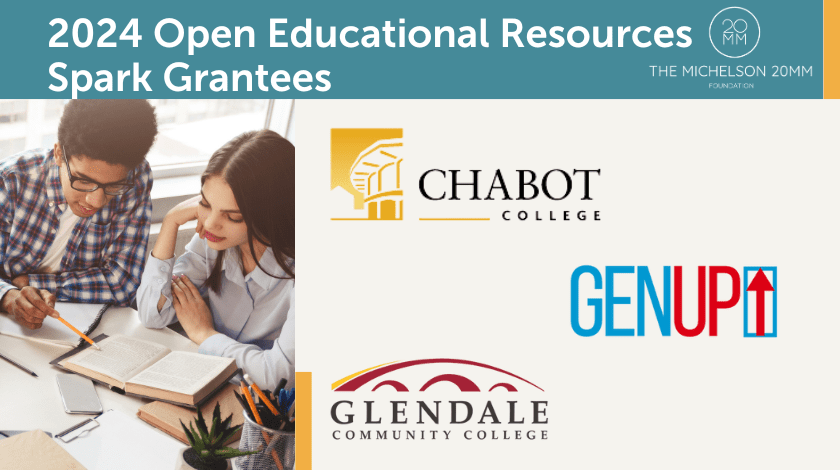Open educational resources (OER) represent a transformative force in education, offering the opportunity for students to benefit from course materials and persist in their degree pursuits. At their core, OER embody the principles of accessibility, affordability, and adaptability, providing unrestricted access to learning materials.
2024 OER Michelson Spark Grants Funding Cycle Focus Areas
As part of our commitment to enhance textbook affordability and advance equity in postsecondary education, the Michelson 20MM Foundation was proud to open the 2024 OER Spark Grants Funding Cycle. The cycle sought to advance projects in support of the following focus areas:
California:
- Support the implementation of California’s historic investment in the Zero Textbook Cost degree program in the California Community College (CCC) system with a focus on capacity building, professional development, and scaling OER marketing.
- Support the development of and/or the rollout of OER programs throughout the University of California (UC) system with a focus on capacity building, professional development, student advocacy, and OER marketing.
- Mobilize student and/or faculty participation in passing OER policies at the UC, CCC, and/or California State University (CSU) systems.
National:
- Execute public education campaigns targeting media outlets with national, broad-reaching readership to educate college and university administrators, policy makers, and the broader public on course material affordability issues within higher education, with a focus on California. Preference will be given to projects that target media outlets whose focus is beyond education.
- Research and public education around automatic textbook billing, with an emphasis on student experience and consumer protection for policy makers. We are particularly interested in research on the prevalence, types, and impact of automatic textbook billing that is occurring within the three California public higher education systems.
- Investigate how coursemarking and course material price transparency impact student behavior and/or student success. With multiple models of coursemarking, including zero textbook cost and ranges in low textbook costs, we are interested in understanding how students navigate these models and how it impacts the decisions they make.
With heartfelt appreciation for every organization that submitted a letter of interest and for our Spark Community Advisors, who sought to ensure projects would advance scalable solutions, Michelson 20MM is proud to welcome the three 2024 OER Spark Grantees!
Chabot College
Chabot College, in collaboration with the Academic Senate for California Community Colleges Open Educational Resources Initiative (OERI), is driving innovation through data-driven approaches to promote ZTC and OER adoption across all of California’s degree-granting community colleges. Through the development of a scalable dashboard model, Chabot is empowering institutions to make informed decisions and advocate for ongoing funding and policy support. With a focus on equity and collaboration, Chabot’s initiative to track ZTC adoptions via this dashboard will begin with a six campus pilot and has the potential to revolutionize OER efforts. If proven successful across multiple campuses, this model may be scaled statewide.
Generation Up
Generation Up (GENUp) is inspiring change and activating student organizers to promote affordable education policies across the UC campuses. With campaigns launching at UC Berkeley, UC San Diego (UCSD), and UC Los Angeles (UCLA), GENUp is mobilizing students to promote the adoption and creation of OER on each campus. While their efforts will directly reduce reliance on costly textbooks at the UCs, GENUp hopes to also influence policies within the CSU system and CCCs, paving the way for a future where education is accessible to all students in California.
Glendale Community College
Glendale Community College (GCC) is leading the way in improving student access to affordable course materials through a study on course marking. By enhancing their Student Information Systems (SIS) to include easy-to-spot, image-based markers indicating ZTC and low textbook cost (LTC) courses, GCC plans to deepen its understanding on how clear and consistent marking of ZTC courses may impact student experiences in finding and enrolling in these types of courses. Since 26 CCCs use the same SIS, GCC’s efforts and final report have the potential to impact how campuses with similar systems mark their zero cost courses and collect vital data on student decision making.
We look forward to sharing the impact of Chabot College’s, GENUp’s, and GCC’s efforts!
Michelson 20MM is a private, nonprofit foundation working toward equity for underserved and historically underrepresented communities by expanding access to educational and employment opportunities, increasing affordability of educational programs, and ensuring the necessary supports are in place for individuals to thrive. To do so, we work in the following verticals: Digital Equity, Intellectual Property, Smart Justice, Student Basic Needs, and Open Educational Resources (OER). Co-chaired and funded by Alya and Gary Michelson, Michelson 20MM is part of the Michelson Philanthropies network of foundations.
To sign up for our newsletter, click here.
